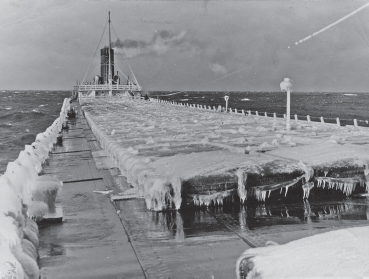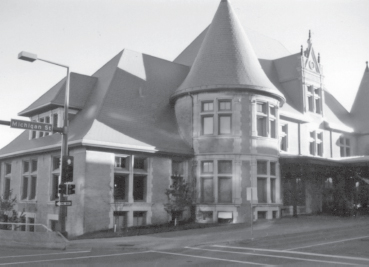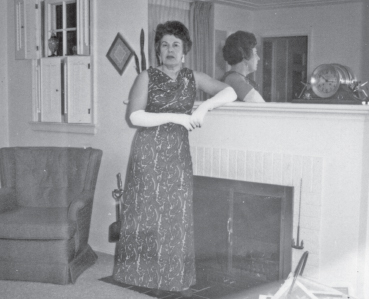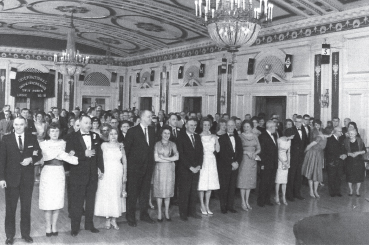Ship Captain's Daughter (5 page)
Read Ship Captain's Daughter Online
Authors: Ann Michler Lewis

Summer passed quickly and merged into the cold and severe weather of fall. By the first of November, we started to wait again for the end of the shipping season and for Christmas, which was a homecoming for us as well as a holidayâa celebration of safe reentry to extended family, city life, and “land time.” When the sailors came back at season's end, I always got to skip school to meet them.
It was eight o'clockâthe time I usually left for schoolâbut today was different. The train was due in half an hour. It took only fifteen minutes to get there, but we didn't want to be late and miss seeing the sailors get off. I asked Mom if they were coming into the “castle station,” as I called it. It was so grand to go to Duluth's Union Depot. The round turrets made it look like a French château, which made me feel important. We parked and asked what track the train from Chicago would be coming in on, and then we walked down to the gate to join the little group of sailors' wives and children who were already there, shivering from the cold and the excitement. When we heard the train chug around the bend, all the other school-skipping kids and I started jumping up and down as we watched the engine puff toward us and roll to a stop.
Steam shot out from between the wheels, and then the conductor whistled and put down the step stool, and the men detrained: Mary and Peggy's dad, Ellen and Mick's, and Tom and Marshall's,
and then mine, taller than all the rest and looking like a movie star in his traveling suit, bow tie, and hat. Dad kissed Mom first and then bent down to me so we could rub noses. I was so excited to see him, and, of course, to stop by Bridgeman's to buy the hand-packed vanilla ice cream we needed to make a treat we always had whenever he came home, even if it was in the morning: giant root beer floats.

Dad's ship encased in ice on Lake Huron, headed for Ashtabula, in December 1968. Ice, though beautiful, could be dangerous, increasing the weight of the ship by many tons and causing it to ride lower in the water or to list.
When we got home, a spruce tree was waiting for us in the yard. While we were gone, my grandfather had delivered it and put it in a snowbank by the back door. He knew that the first thing Dad would want to do was to put up the Christmas tree. He was always in charge of the trimming. He liked to get it “just right.”
Usually, Dad was home by the beginning of December, but this year the sailing season had been extra long, and he'd had to
make a couple of extra trips. It was now only a week before Christmas.

At the end of each season, my father often arrived at the Duluth Depot, which served seven different rail lines. It became a museum in 1973 and now houses several ore malleys, huge retired engines used to pull the ore trains from the mines to the ships in the port.
After our root beer float breakfast, Dad unpacked. By lunchtime, his mackinaw was back in the basement closet. His suit and good hat for the train trip were hung up, his bow tie was back in the top dresser drawer, his toothbrush was back in the bathroom holder, and his slippers were back on his side of the bed. Once again, everything was in its place. He was home from another nine months on the water.
The first thing the next morning, we started out with a trip to the hardware store in the big brown Buick Roadmaster. He was happy to drive the car again, and I was happy to be in the passenger seat up front instead of in my usual “safer” place in the back. He had taken the tree into the house to defrost the previous afternoon, and now we were going to trim it. He had saved last
year's tinsel, wrapping it carefully around a paper towel roll, but somehow when he took it out, it looked a little frayed, too tangled and not “new,” so we were off to see Mr. Neipp, who always put bows on the shovels and an elf on the cash register at Christmas. An hour later, we were back home with four boxes of new tinsel, a new extension cord, a box of replacement bulbs, and a jolly new Santa ornament that I got to pick out.
Dad lit a cigarette, inhaled, and balanced the cigarette on the big brass ashtray on the coffee table. He put on a recordâBing Crosby's
Christmas Carols
âand started to make the magic. First, he made a fresh cut on the trunk, and then he balanced the tree in the stand in front of the window with me holding it while he adjusted the screws. Next came the lights that he fitted over the branches and tightened with little red wooden beads. He moved the bulbs around on the branches, and replaced a few, too, to insure that two orange or red bulbs wouldn't end up too close together. And finally, his specialtyâthe shimmering silver strands of icicles. Slowly, he unwound the tinsel from the cardboard. One by one, he gently placed each piece, working from front to back, making the branches look like fringed arms. Next came the ornaments. After they were all on, he took the star out of its own special box, with its own white light. He put it on the top, and the tree was done. We turned off the lamps in the living room. The star made a shadow on the wall. The colored lights reflected in the windows. We put the empty boxes temporarily in the corner, and then, Dad said, it was time for a nap.
The house smelled of spruce. He turned over the record, now being the perfect time for “I'm Dreaming of a White Christmas.” Then, he lay down on the couch and fell into a deep, snoring sleep. His one arm grew limp and flopped down toward the floor.
He had been gone since March, sleeping when he could, sometimes in the day, sometimes in the night, his days and nights dictated by weather, or narrow waters, landing at the Soo, or
“doing” the rivers leading up to the steel mills in Chicago, Toledo, or Buffalo. But now, the tree was up once again, and it was Christmas. He was home with us and safe. I drew close and watched him as he slept. I bent down and looked closely at his arm. The snake's eyes were opposite mine. I had never been this close to it before; usually, his tattoo was covered. The inky blue, dark green, and charcoal grey drawing on his arm depicted a dagger in a sheath with a snake wrapped all around it. The snake had a raised hooded head, yellow eyes, and a forked tongue. Dad's vein pulsed through it. Bump, bump. The snake and I stared at each other. What was he doing on my dad?
I traced it with my eyes for maybe a half hour, over and over again. When Dad awoke, he yawned and smiled and drew in his arms and rolled down and buttoned his sleeves. Then he got up and stretched.
I was just getting up the courage to ask him about his tattoo when Mom came in to look at the tree, and then it was time for dinner, and for some reason, I never did. Later, when I asked my mother about it, she just said, “Oh, you know, he was young and full of vinegar. He got it with the boys on the ship. I think they all got them when they first shipped out.”
But there seemed to be something more mysterious about it. It made me wonder about all the places he had been before I knew him.
In January, Mom and Dad went to the Hotel Duluth for the shipmasters' ball. When the big night arrived, I watched my mother spread her hand on the phone table upstairs and paint her fingernails with bright red nail polish. She let the white parts show, placing the polish carefully around the “half moons,” and then she walked around the upstairs waving her hands in the air, talking to Dad as he took his dark dress suit out of the closet, brushing it off one more time. He put on his belt, sliding the buckle over to the side as he always did, and then took his best
tie from the tie rack where he kept it, already knotted and ready to slip over his head.
Mother put on her nylons, first rolling them up carefully so she could put her foot in them, unrolling them gently so they wouldn't snag, then stretching and pulling them up to hook onto her garters. One year her dress was sleeveless, even though it was winter, and she wore long white gloves.
When her dress was on, she fluffed her hair, put on her dangly earrings, sprayed Tabu cologne behind her ears, and put on her fancy high-heeled shoes, which showed her toes. After one last look in the full-length mirror, she picked up her evening bag and floated down the stairs like a queen. Every year Dad came down and took a picture of her in front of the fireplace. They sat down together for a little while, had a drink and a toast, and then they put on their coats. Mom wore her beautiful mink, which she carefully took out of the zippered storage bag in the closet under the stairs. She handed it to Dad, who held it up for her, showing the silky beige satin lining. Closing her eyes dreamily as she slipped her arms into it, she then gave my grandparents and me careful kisses that left red lipstick smudges on our cheeks.
Dad put on his topcoat and then his hat, cocking it slightly to one side, and they swept out the door and drove off in the big Buick Roadmaster to celebrate the end of another season by dancing above the frozen lake, together.

Mom poses in our living room for an annual picture before leaving for the shipmasters' ball.

My parents, pictured on the far left of the front row, in the Hotel Duluth ballroom
In the summer, Mom occasionally had the sailors' wives over for lunch, but in the winter when the men were home, she and Dad had their sailing friends over for dinner. Dad built a fire and served highballs in glasses that we used only for special company. They were stored in the cupboard above the refrigerator, and every time he took them down, Mom told me they were a wedding present. There were eight glassesâtwo pale pink, two blue, two yellow, and two cream-colored, all with gold flowers on them.
I helped put out nuts and cheese and crackers, and when our
guests arrived, I carried their coats upstairs to lay them on Mom and Dad's bed. While they ate and talked, I sat at the top of the stairs and listened. Over the background music of Guy Lombardo on the stereo, I heard the wives talking about their auxiliary meetings and discussing their trips aboard ship this year, what the weather had been like, what ports they had gone to, whether they had landed in the daytime or at night, and if they had been able to get off to go “uptown” to shop or do errands. All the wives hated to go to Buffalo, because it was a mile-long walk through the ore piles to the gatehouse, where they could finally call for a taxi.
